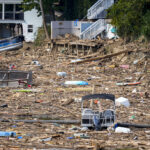The morning that Hurricane Helene tore Asheville, North Carolina, apart, the first faces I saw were half a dozen of my neighbors preparing to break into my home to see if I was alive. A 40ft oak – ripped from its roots from the next yard – lay on my bedroom roof, dewy green scalloped leaves resting against my window. Just meters below the buckling ancient fascia from my century-old home’s roof, my cattle dog Teddy and I slept. It seems like we should have been crushed there, in bed.
Many were. At least 227 people have died, and that toll is only going to get higher. The rivers are giving up the dead; landslides are yielding corpses. The destruction is grotesque and, in some cases, total, with bridges condemned, roadways eviscerated, and whole towns – Swannanoa, Hot Springs – obliterated. The personal terror I felt that morning is nothing compared to the rage I feel on behalf of those lives unnecessarily lost, those displaced, those struggling to access too few services, and at a governmental response that has seemingly prioritized the most privileged.
I am one of those most privileged. The Federal Emergency Management Agency (Fema) showed up to my affluent, resource-secure neighborhood of Asheville on 1 October. However, I have been without power, water and wifi, and had only spotty cell service, since 27 September. There is a curfew in place, there are gas shortages and everyone is living with a profound feeling of disconnection from the rest of the world.
Besides hearing that Joe Biden did an aerial overpass of our region (“We’ve got your back”) and the appearance of Fema trucks in my gentrified neighborhood on Tuesday, I have seen little evidence of the robust, coordinated, multi-agency response for which I and many others had hoped. Perhaps that’s in part because the roads are in various states of destruction and the cell network barely usable. But, having lived through the pandemic in 2020, I’m skeptical.
Any food I have personally eaten, water I have drank or hope I have felt has come from my neighbors and community. And there is so much hope here: Appalachian people are not a monolith – many of my fellow North Carolinians sit on the other side of the political aisle from me – but I have witnessed enough selfless generosity to keep my heart afloat while we continue to rebuild.
But we cannot rebuild critical water infrastructure, roadways, bridges or our economy from within. The truth is that we need immense federal emergency funding. Right now, western North Carolina does not look at all how you may remember from your bachelorette or mountain biking getaway. There is a day-to-day struggle to survive here right now and a fundamental lack of sustainable resources or services. We are not looking at weeks to recover; we are looking at months and years.
